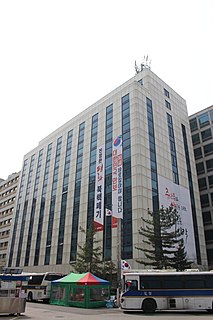
The Liberty Korea Party was a conservative political party in South Korea that was described variously as right-wing, right-wing populist, or far-right. Until February 2017, it was known as the Saenuri Party (Korean: 새누리당), and before that as the Hannara Party from 1997 to 2012, both of which are still colloquially used to refer to the party. The party formerly held a plurality of seats in the 20th Assembly before its ruling status was transferred to the Democratic Party of Korea on December 27, 2016, following the creation of the splinter Bareun Party by former Saenuri members who distanced themselves from President Park Geun-hye in the 2016 South Korean political scandal.
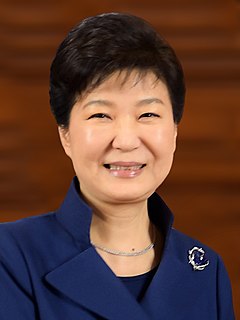
Park Geun-hye is a South Korean former politician who served as President of South Korea from 2013 to 2017. Park was the first woman to be President of South Korea and also the first female president popularly elected as head of state in East Asia. She was also the first South Korean president to be born after the founding of First Republic of Korea; her predecessors were born either during the Joseon dynasty, Japanese rule or during the post-World War II American occupation. Her father, Park Chung-hee, was the President of South Korea from 1963 to 1979, serving five consecutive terms after he seized power in 1961.

My 19 Year Old Sister-in-Law is a 2004 South Korean television series starring Jung Da-bin, Yoon Kye-sang, Kim Jaewon and Kim Min-hee. It aired on SBS from July 28 to September 23, 2004 on Wednesdays and Thursdays at 21:55 for 16 episodes.
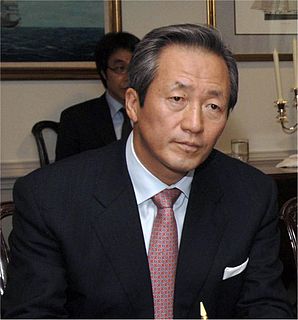
Chung Mong-joon or Chung Mong Joon is a South Korean businessman and politician. He is the sixth son of Chung Ju-yung, founder of Hyundai, the second-largest South Korean chaebol before its breakup in 2003. He remains the controlling shareholder of a Hyundai offshoot, Hyundai Heavy Industries Group, parent of the world's largest shipbuilding company. He is also the chairman of the board of the University of Ulsan and Ulsan College in Ulsan, South Korea. He is the founder and the honorary chairman of The Asan Institute for Policy Studies. He was Honorary Vice-President of FIFA and president of the South Korean football association.

Presidential elections were held in South Korea on 19 December 2007. The election was won by Lee Myung-bak of the Grand National Party, returning conservatives to the Blue House for the first time in ten years. Lee defeated United New Democratic nominee Chung Dong-young and independent Lee Hoi-chang by a nearly 2-to-1 margin, the largest since direct elections were reintroduced in 1987. It also marked the first time a president-elect in Korea was under investigation by a prosecutor. Voter turnout was 63.0%, an all-time low according to the National Election Commission.

Legislative elections were held in South Korea on April 9, 2008. The conservative Grand National Party won 153 of 299 seats while the main opposition United Democratic Party won 81 seats. This election marked the lowest-ever voter turnout of 46.0%.

Big Thing is a 2010 South Korean television drama based on manhwa artist Park In-kwon's comic Daemul, and stars Go Hyun-jung as Korea's first female president. Number one in its timeslot for 11 consecutive weeks, it gained successful ratings due to its cast and story arcs based on topical and controversial themes.
Starting from the dictatorship of Park Chung-hee with military coups d'état and the scandals facing the conservative government, including accusations of government interference in the presidential election, Conservatism in South Korea is chiefly associated with the United Future Party. Within the party, groups such as the New Right promote conservatism. The conservative Park Geun-hye government was the last conservative government of the Sixth Republic of South Korea since 2017.

Presidential elections were held in South Korea on 19 December 2012. They were the sixth presidential elections since democratization and the establishment of the Sixth Republic, and were held under a first-past-the-post system, in which there was a single round of voting and the candidate receiving the highest number of votes was elected. Under the South Korean constitution, a president is restricted to a single five-year term in office. The term of the then incumbent president Lee Myung-bak ended on 24 February 2013. According to the Korea Times, 30.7 million people voted with turnout at 75.8%. Park Geun-hye of the Saenuri party was elected the first female South Korean president with 51.6% of the vote opposed to 48.0% for her opponent Moon Jae-in. Park's share of the vote was the highest won by any candidate since the beginning of free and fair direct elections in 1987.

Moon Jae-in is a South Korean politician and human rights lawyer serving as President of South Korea since 2017. Prior to this, he served as chief of staff to then-president Roh Moo-hyun (2007–2008), leader of the Democratic Party of Korea (2015–2016) and a member of the 19th National Assembly (2012–2016).
Lee Sang-don is a South Korean legal scholar and a conservative political activist. He currently works as a professor at Chung-Ang University. He is a conservative pundit well known for expressing criticisms towards the Lee Myung-bak government. He received criticisms from a group of pro-Lee Myung-bak lawmakers for participating in the restructure of the Saenuri Party in the past due to his distance with Lee Myung-bak. He is currently the political reformer for the Saenuri Party under Park Geun-hye.

Presidential elections were held in South Korea on 9 May 2017 following the impeachment and dismissal of Park Geun-hye. The elections were conducted in a single round, on a first-past-the-post basis, and had originally been scheduled for 20 December 2017. However, they were brought forward after the decision of the Constitutional Court on 10 March 2017 to uphold the National Assembly's impeachment of Park. Following procedures set out in the Constitution of South Korea, Prime Minister Hwang Kyo-ahn succeeded Park as the acting president. After Park was removed from office by the Constitutional Court's ruling, acting president Hwang announced he would not run for a term in his own right.
The 2016 South Korean political scandal involves the influence of Choi Soon-sil, the daughter of a shaman-esque cult leader Choi Tae-min, over President Park Geun-hye of South Korea.

The impeachment of Park Geun-hye, President of South Korea, was the culmination of a political scandal involving interventions to the presidency from her aide. The impeachment vote took place on 9 December 2016, with 234 members of the 300-member National Assembly voting in favour of the impeachment and temporary suspension of Park Geun-hye's presidential powers and duties. Thus, Hwang Kyo-ahn, then Prime Minister of South Korea, became Acting President while the Constitutional Court of Korea was due to determine whether to accept the impeachment. The court upheld the impeachment in a unanimous 8–0 decision on 10 March 2017, removing Park from office. The regularly scheduled presidential election was advanced to 9 May 2017, and Moon Jae-in, former leader of the Democratic Party, was elected as Park's permanent successor.

The Bareun Party was a conservative political party in South Korea, announced on 27 December 2016 with the defection of 29 anti-Park Saenuri Party lawmakers. It was known as the Conservative New Party for Reform until 8 January 2017.
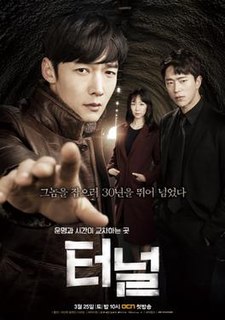
Tunnel is a 2017 South Korean television series starring Choi Jin-hyuk, Yoon Hyun-min and Lee Yoo-young. It replaced Voice and aired on cable network OCN every Saturdays and Sundays at 22:00 (KST) time slot from March 25 to May 21, 2017 for 16 episodes. The series was inspired by the Hwaseong serial murders.
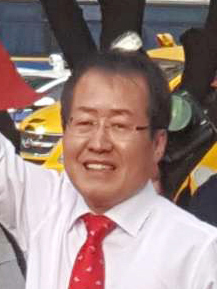
The Liberty Korea Party held a leadership election on 3 July 2017. It was the first election since the Liberty Korea Party became an opposition party.

The United Future Party is a conservative political party in South Korea.
Kim Hyong-o is a South Korean writer and politician. He was a long-term Member of the National Assembly for Yeongdo from 1992 to 2012. During the parliamentary career, he served as the Speaker of the National Assembly from 2008 to 2010.
A presidential election is scheduled to be held in South Korea in 2022. It will be the eighth presidential election since democratization and the establishment of the Sixth Republic. Under the South Korean constitution, the president is restricted to a single five-year term in office, meaning the incumbent president Moon Jae-in is ineligible to run for a second term.














